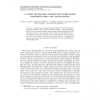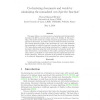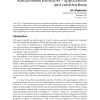745 search results - page 17 / 149 » The origins of combinatorics on words |
CORR
2008
Springer
15 years 1 months ago
2008
Springer
Abstract. A large class of unsupervised algorithms for Word Sense Disambiguation (WSD) is that of dictionary-based methods. Various algorithms have as the root Lesk's algorith...
94
Voted
LREC
2010
15 years 3 months ago
2010
This paper presents and evaluates an original approach to automatically align bitexts at the word level. It relies on a syntactic dependency analysis of the source and target text...
134
Voted
JMMA
2010
14 years 8 months ago
2010
This paper follows a word-document co-clustering model independently introduced in 2001 by several authors such as I.S. Dhillon, H. Zha and C. Ding. This model consists in creatin...
FSTTCS
2009
Springer
15 years 8 months ago
2009
Springer
Randomness extractors are efficient algorithms which convert weak random sources into nearly perfect ones. While such purification of randomness was the original motivation for c...
103
click to vote
IJAC
2008
15 years 1 months ago
2008
species and combinatorial Hopf algebras on the one hand, and quantum groups and the classification theory of abstract Hopf algebras on the other. This is part of joint work with Sw...



